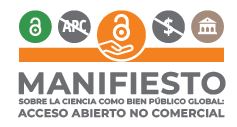Technological skills for investigative management of the participants in the Doctoral Program of Education
DOI:
https://doi.org/10.5281/zenodo.14003301Keywords:
Competencies, technological, management, researchAbstract
The research was entitled Technological competences for the research management of the participants in the Doctoral Education Program. Developed in the principles of Husserl's hermeneutical phenomenology. Methodologically, it assumes the qualitative paradigm in the phenomenological method, with a reflective critical approach, the study subjects were made up of ten participants from the Unermb, Maracaibo doctorate. An in-depth phenomenological interview was used, applying an interpretative-descriptive analysis. The results allowed to consolidate twelve categories of which seven of these were presented with greater rooting. The generation of the theoretical construct was consolidated. It is concluded that the technological competences for the investigative management of the participants in the Doctoral Program of Education are an aspect with little development in most participants, so their research management is limited, more when they are integrated into paradigms and methods which had not been previously exercised.
Downloads
References
Casimiro, W; Ramos, F; Casimiro, C; Barbachán, E. y Casimiro, J. (2021). Competencias investigativas de los docentes de las universidades de Lima, Perú. Universidad y Sociedad, 13(4), 302-308. https://rus.ucf.edu.cu/index. php/rus/article/view/2169/2150
Centeno-Caamal, R. (2021). Formación Tecnológica y Competencias Digitales Docentes. Revista Tecnológica-Educativa Docentes 2.0, 11(1), 174-182. https://doi.org/10.37843/rted.v11i1.210
Flick, Uwe (2007). Introducción a la Investigación Cualitativa. Editorial Morata. España.
Hernández, R; Fernández, C. y Batista, L. (2014). Metodología de la Investigación. Editorial Mc GrawHill, (6ta. ed.) México.
Martorell, S. y Valero, M. (2015). Las TT. II. CC. en la enseñanza universitaria. La UPV como caso de estudio. https://produccioncientificaluz.org/index.php/opcion/article/view/20575. Venezuela.
Medina, A. (2021). Herramientas tecnológicas en la gestión docente del proceso de formación plan la universidad en casa y educación a distancia. Revista Universidad y Sociedad, 13(4), 258-266.
Waldenfels, B. (2017). Fenomenología de la experiencia en Edmund Husserl. Areté, 29(2), 409-426. https://dx.doi.org/10.18800/arete.201702.008
Xiong, L. y Lim, C. (2015). Curriculum leadership and the development of ICT in education competencies of pre-service teachers in South China. The Asia-Pacific Education Researcher, 24(3), 515-524.
Yangali, J; Vasquez, M; Huaita, D. y Luza, F. (2020). Cultura de investigación y competencias investigativas de docentes universitarios del sur de Lima. Revista Venezolana De Gerencia, 25(91), 1159-1179. https://doi.org/10.37960/rvg.v25i91.33197
Published
How to Cite
Issue
Section
License
Copyright (c) 2024 Universidad Alonso de Ojeda

This work is licensed under a Creative Commons Attribution-NonCommercial-ShareAlike 4.0 International License.
All content of Ethos Journal will be free access, distributed under the Creative Commons license (BY-NC-SA).




